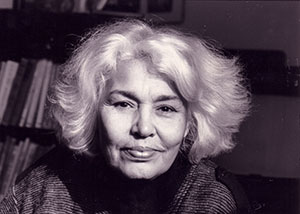
Nawal El Saadawi
Nawal El Saadawi writes at IslamiCommentary (translated by miriam cooke)
Every revolution in history has had its counter-revolution. Most recently, internal and external forces allied, as they did in Egypt, to abort the January 2011 revolution.
But the Muslim Brotherhood failed to abort this latest revolution on June 30, 2013, and they will continue to fail because those who have rebelled against them have learned the lessons of the past. Their consciousness has deepened with organization and unity.
Thirty-four million youth, men, and women went out into the streets and squares. They were determined to topple the religious government, under the control of the Muslim Brotherhood, as well as stand up to all who supported the Brotherhood them at home and abroad .
They wanted to expel all who would use religion for economic and political gain and to oust Morsi. The will of the people was and is more powerful than the military, the police, and any religious or economic weapons. Here is the lesson of human history: There is no principle higher than truth and sincerity in the quest for freedom, justice and dignity.
During its rule, the Muslim Brotherhood tried to divide the people into believers and heretics, but it failed. There were many believers (in Islam) in the anti-Morsi crowds. The power of the millions was like the sea that protects itself with its own strength, and its tremendous waves swept away the jinn and the ghosts.
Muslim Brotherhood militias killed young men and women, but the multitudes in the streets, in the neighborhoods and in the countryside kept growing. They were not afraid of the bullets, they did not retreat one step, but kept advancing until they toppled the regime.
The revolutionaries turned to the national army and the army responded. The police, also, served the people and not the regime.
The age of jinn, spirits and nonsense has ended. The light of knowledge, truth, love and creativity are increasing day by day.
And yet, there are imperialists and Americans who claim that this was not a revolution that demands a new legitimate regime, but merely a crisis, or a coup against democracy.
On July 5, I watched a group of American men on CNN threatening to cut off aid to the revolutionary Egyptian people. And I laughed out loud. I hope that they cut off this aid! Since the time of Anwar Sadat in the 1970s, this aid has destroyed our political and economic life. This aid helps the U.S. more than anyone else. This aid goes directly into the pockets of the ruling class and corrupts it. This aid has strengthened American-Israeli colonial rule in our lands. All that the Egyptian people have gained from this aid is more poverty and humiliation.
Democracy is about more than elections. Legitimacy means more than the ballot box, it means the power of the people.
We Egyptians need a new constitution that will realize the principles of the revolution: equality for all without distinction of sex, religion or class. This we must do first, not just rush to presidential and parliamentary elections. We should not put the cart before the horse. We must not repeat mistakes.
We need a communal, revolutionary leadership and not a single leader.
This is a historical revolution and not a coup d’etat or protest movement or outraged uprising. It is a revolution that will continue until all of its goals are realized.
—
Nawal El Saadawi is an internationally renowned Egyptian writer who’s writing has influenced five generations of women and men in Egypt and other Arab countries, and paved the way for dissidence, rebellion and revolution. For more than four decades she has suffered under Egyptian political and religious authorities, which has led to imprisonment, exile, death threats and court trials.
—
miriam cooke is the Braxton Craven Professor of Arab Cultures at Duke University, and Director of the Duke University Middle East Studies Center. She specializes in the study of gender and war in the Arab world, Islamic feminism, modern Arabic literature and culture. Her work focuses on the fiction and films of Egyptians, Lebanese, Syrians, Iraqis, and Algerians and the political networks that Muslim women are creating in the 21st century. Her new book Tribal Modern: Branding New Nations in the Arab Gulf (University of California Press, January 2014) is forthcoming.
Related Posts:
—–
Mirrored from IslamiCommentary


 © 2025 All Rights Reserved
© 2025 All Rights Reserved